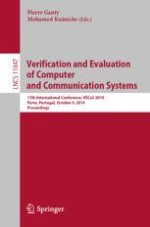This book constitutes the proceedings of the 13th International Conference on Verification and Evaluation of Computer and Communication Systems ( VECoS 2019), held in Porto, Portugal, in October 2019.
The 7 full papers in this volume, presented together with two invited talks, were carefully reviewed and selected from 13 submissions.
The aim of the VECoS conference is to bring together researchers and practitioners in the areas of verification, control, performance, and dependability evaluation in order to discuss state of the art and challenges in modern computer and communication systems in which functional and extra-functional properties are strongly interrelated. Thus, the main motivation for VECoS is to encourage the cross-fertilization between various formal verification and evaluation approaches, methods and techniques, and especially those developed for concurrent and distributed hardware/software systems.
